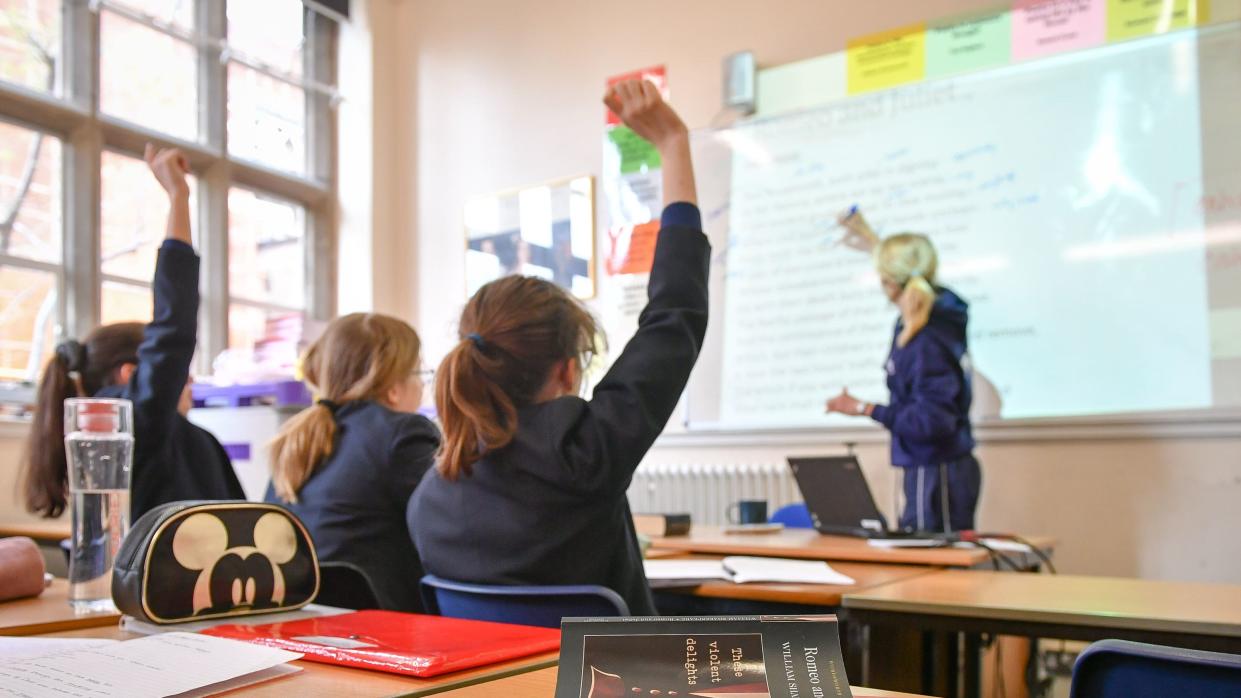RE lessons failing to provide pupils with ‘depth’ of knowledge needed – Ofsted

Religious education in most schools lacks “depth” and pupils remember “little” when many religions are covered in the curriculum, Ofsted has suggested.
The watchdog’s report, which looks at how religious education (RE) is being taught in England’s schools, said a “superficially broad curriculum” does not always provide pupils with the knowledge they need.
Most non-examined RE in secondary schools is “limited and of a poor quality” – and the curriculum often lacks “sufficient substance to prepare pupils to live in a complex world”, it said.
The report – which draws on findings from 50 visits to schools – said: “What pupils know and remember about the subject is noticeably patchy. Misconceptions abound.
“A superficial and limited approach to RE sometimes ends up normalising caricatures or the most extreme or ‘unusual’ religious traditions.”
🧵 1/4 – We’ve published our subject report on the quality of religious education (RE) in schools:https://t.co/tk5NtPmqXG
— Ofsted (@Ofstednews) April 17, 2024
The review highlighted that some pupils were taught ideas that did not accurately reflect the traditions they were learning about – such as the idea of Christmas as “God’s birthday”.
Pupils in one secondary school had developed misconceptions such as “Christians don’t like gay things”, the report added.
It found a notable proportion of schools did not meet the statutory requirement to teach RE to all pupils at all key stages.
The watchdog has called on the Government to urgently update guidance for schools about its statutory expectations for RE and ensure there is clarity about what should be taught and when.
It is compulsory for all state schools in England to teach RE to pupils – apart from those who have been withdrawn from lessons by their parents.
🧵 3/4 – Recommendations include that schools should make sure that:
👉there’s a distinct RE curriculum👉teachers have high expectations of what pupils will know and remember👉all teachers have strong subject and pedagogical knowledge
Read the report: https://t.co/MZ16O4JUzN
— Ofsted (@Ofstednews) April 17, 2024
The report said: “A superficially broad curriculum does not always provide pupils with the depth of knowledge they require for future study.
“In most cases, where the curriculum tried to cover many religions, like equal slices of a pie, pupils generally remembered very little.”
It added that the content of some secondary curriculums was “restricted” by what teachers considered pupils needed to know for exams.
In a significant number of cases, teachers taught examination skills “too prematurely”, which limited the range of RE content taught, the review found.
The findings from inspections and research visits, carried out between September 2021 and April 2023, suggested an ambitious RE curriculum is still a “work in progress” in some schools.
The report called on schools to ensure there is a distinct curriculum in place for teaching RE at all key stages which is “rigorous and challenging”.
It found that the majority of teachers had not received subject-based professional development in RE, which it called a “significant concern” due to the complexity of the subject and the “misconceptions” that pupils are left with.
It concluded that RE content selected was rarely enough to ensure pupils were “well prepared to engage in a multi-religious and multi-secular society”.
Ofsted chief inspector Sir Martyn Oliver said: “A strong RE curriculum is not only important for pupils’ cultural development, it is a requirement of law and too many schools are not meeting that obligation.
“I hope that the examples of good RE curriculum in our report help schools develop their own practice and support the development of a strong RE curriculum for all.”
Pepe Di’Iasio, general secretary of the Association of School and College Leaders (ASCL), said: “The most telling part of Ofsted’s report is its conclusion that there is a lack of clarity on the RE curriculum and its suggestion that the Government should provide better guidance about what should be taught and when.
“In fact, this doesn’t go far enough as the only real solution is a review of the curriculum as a whole to ensure that it is deliverable, focuses on a set of agreed priorities, and that it aligns with what is required in performance tables and Ofsted inspections.
“At present, the system is extremely confused and schools are left in an impossible position of having to spin far too many plates with far too few resources.”
Sarah Lane Cawte, chairwoman of the Religious Education Council of England and Wales, said: “In recent years RE has suffered from a gulf in Government funding and the axing of the teacher training bursary.
“Whilst the bursaries have been reinstated, there is still much to be done. We are pleased that this Ofsted report calls for more Government action to support RE across the sector.”
Ofsted’s ‘Deep and meaningful? The religious education subject report’ highlights need for urgent subject support.
Read our full response below.https://t.co/YVbL8kpJDy@ReThinkREnow @NATREupdate@educationgovuk
— Religious Education Council (@RECouncil) April 17, 2024
A Department for Education spokesman said: “Religious education helps develop pupils’ understanding of different faiths and is compulsory for all pupils at state-funded mainstream schools up to the age of 18.
“To support RE teaching, we provide bursaries of £10,000 for trainee RE teachers, while Oak National Academy is procuring new materials to ensure high-quality RE lessons are available nationwide, benefitting both teachers and pupils.”

 Yahoo News
Yahoo News 
